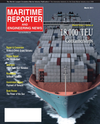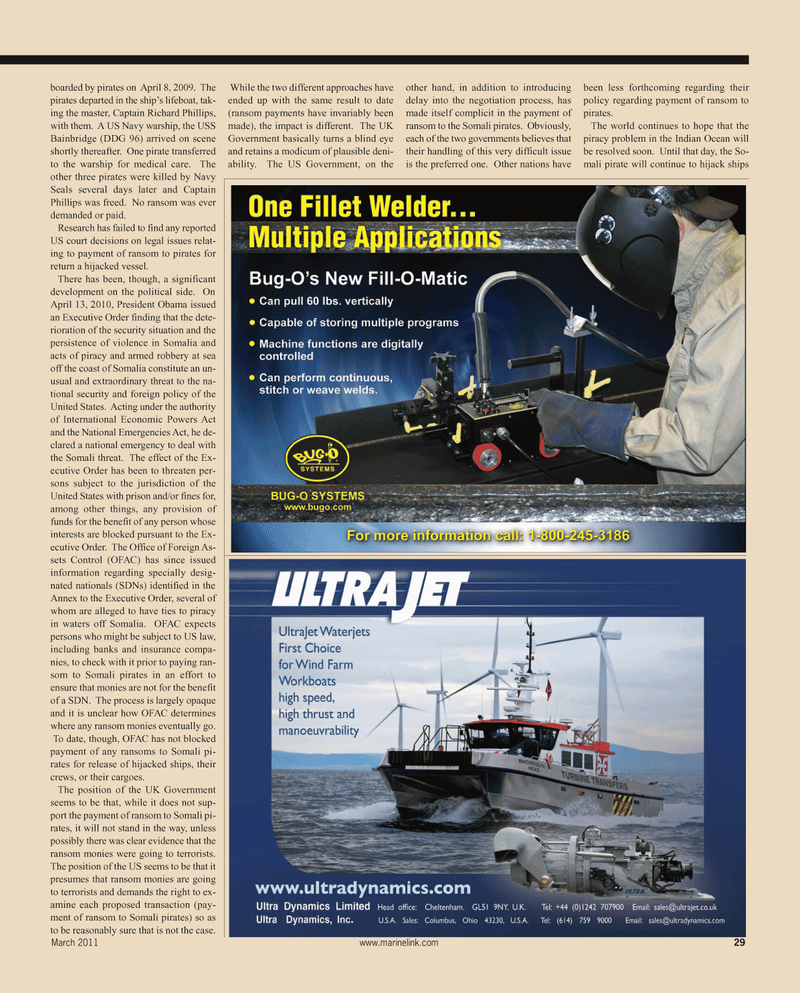
Page 29: of Maritime Reporter Magazine (March 2011)
Ship Repair & Conversion
Read this page in Pdf, Flash or Html5 edition of March 2011 Maritime Reporter Magazine
boarded by pirates on April 8, 2009. The pirates departed in the ship’s lifeboat, tak- ing the master, Captain Richard Phillips, with them. A US Navy warship, the USS
Bainbridge (DDG 96) arrived on scene shortly thereafter. One pirate transferred to the warship for medical care. The other three pirates were killed by Navy
Seals several days later and Captain
Phillips was freed. No ransom was ever demanded or paid.
Research has failed to find any reported
US court decisions on legal issues relat- ing to payment of ransom to pirates for return a hijacked vessel.
There has been, though, a significant development on the political side. On
April 13, 2010, President Obama issued an Executive Order finding that the dete- rioration of the security situation and the persistence of violence in Somalia and acts of piracy and armed robbery at sea off the coast of Somalia constitute an un- usual and extraordinary threat to the na- tional security and foreign policy of the
United States. Acting under the authority of International Economic Powers Act and the National Emergencies Act, he de- clared a national emergency to deal with the Somali threat. The effect of the Ex- ecutive Order has been to threaten per- sons subject to the jurisdiction of the
United States with prison and/or fines for, among other things, any provision of funds for the benefit of any person whose interests are blocked pursuant to the Ex- ecutive Order. The Office of Foreign As- sets Control (OFAC) has since issued information regarding specially desig- nated nationals (SDNs) identified in the
Annex to the Executive Order, several of whom are alleged to have ties to piracy in waters off Somalia. OFAC expects persons who might be subject to US law, including banks and insurance compa- nies, to check with it prior to paying ran- som to Somali pirates in an effort to ensure that monies are not for the benefit of a SDN. The process is largely opaque and it is unclear how OFAC determines where any ransom monies eventually go.
To date, though, OFAC has not blocked payment of any ransoms to Somali pi- rates for release of hijacked ships, their crews, or their cargoes.
The position of the UK Government seems to be that, while it does not sup- port the payment of ransom to Somali pi- rates, it will not stand in the way, unless possibly there was clear evidence that the ransom monies were going to terrorists.
The position of the US seems to be that it presumes that ransom monies are going to terrorists and demands the right to ex- amine each proposed transaction (pay- ment of ransom to Somali pirates) so as to be reasonably sure that is not the case.
While the two different approaches have ended up with the same result to date (ransom payments have invariably been made), the impact is different. The UK
Government basically turns a blind eye and retains a modicum of plausible deni- ability. The US Government, on the other hand, in addition to introducing delay into the negotiation process, has made itself complicit in the payment of ransom to the Somali pirates. Obviously, each of the two governments believes that their handling of this very difficult issue is the preferred one. Other nations have been less forthcoming regarding their policy regarding payment of ransom to pirates.
The world continues to hope that the piracy problem in the Indian Ocean will be resolved soon. Until that day, the So- mali pirate will continue to hijack ships
March 2011 www.marinelink.com 29

 28
28

 30
30
